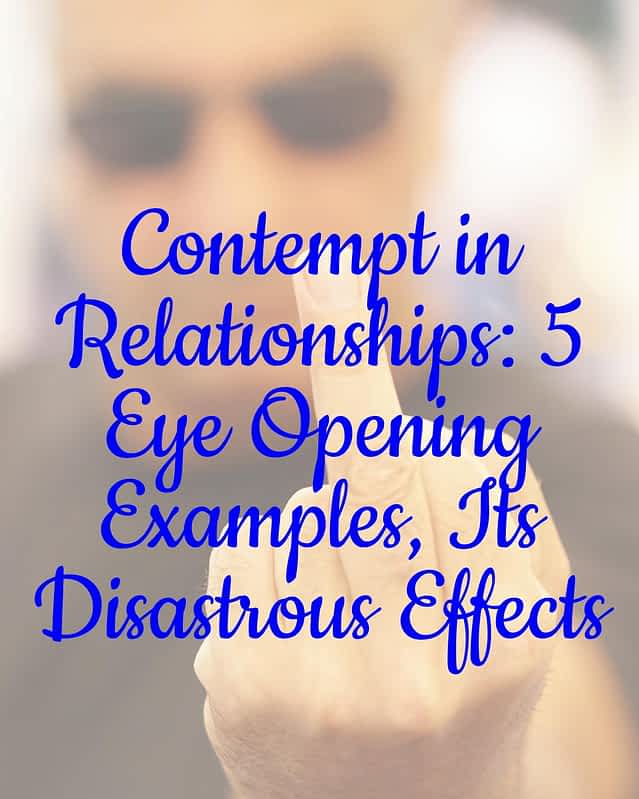Contempt in Relationships: 5 Eye Opening Examples, Its Disastrous Effects
Contempt in relationships doesn’t always kick the door down, it seeps in through the cracks. A sarcastic tone here, an eye roll there, and before you know it, connection gives way to control. It creeps in slowly, through little jabs, eye-rolls, and that heavy silence that says, you’re not worth hearing. If your partner constantly mocks you, uses sarcasm as a weapon, or dismisses everything you say, that’s not just frustration – it’s contempt. And contempt in relationships is a slow emotional destroyer.
You start to question your worth. You tiptoe around conversations. You feel invisible in your own life. These are just a few signs of contempt in a relationship, and they do real damage. Not just emotionally, but physically too. Headaches, stomach issues, a weakened immune system, it all connects.
Key Highlights:
- 😒 What a quick smirk, curled lip, or dead-eyed stare might really be saying
- 🤔 Why someone who claims to “love you” might still look at you with disgust
- 🧷 The quiet damage these facial expressions can do over time (yes, even the eye roll)
- 🚷 What to do when those microexpressions become part of everyday life
- ❓What it might actually mean when contempt becomes your relationship’s new normal
What contempt looks like in marriage isn’t always loud. Sometimes, it’s a smirk when you’re being vulnerable. Or a sigh so deep it shuts you down. These microexpressions of contempt, the little eye rolls, the raised eyebrows, the smirks – speak volumes, even when no one says a word. Over time, these subtle put-downs erode the trust and emotional safety that relationships are supposed to thrive on.
And if it keeps going unchecked, the long-term effects of contempt in marriage can be brutal. Anxiety. Depression. Feeling like you have to shrink yourself to survive. Contempt turns into resentment, emotional distance, and sometimes, total disconnection. It doesn’t fix problems – it just fuels control and domination.
You can’t build love on top of disdain. And if you want to save your relationship, or yourself – spotting signs of contempt in a relationship is step one.

My Own Experience With Contempt in Relationships
💔I Lived With Contempt for Decades—Here’s What It Did to Me
I’m a walking example of what contempt in a relationship can do to a person over time. For years, I watched my husband roll his eyes at me, dismiss what I said, or mock me in front of others like it was nothing. These weren’t one-off moments. They were regular occurrences, and I let them slide for far too long.
💔Contempt Doesn’t Always Yell—Sometimes, It Sneers
One of the most subtle but damaging signs of contempt in a relationship is how small it can look on the outside, an eye roll, a heavy sigh, a smirk. Those microexpressions of contempt chipped away at me slowly, like water wearing down stone. And because I didn’t set strong boundaries early on, that steady emotional erosion turned into something physical.
By 2016, 22 years into our marriage, I was diagnosed with Crohn’s disease, a lifelong autoimmune disorder that affects the digestive system. I’d already been dealing with chronic insomnia, and I fully believe the emotional stress from my marriage played a massive role in breaking down my immune system.
The long-term effects of contempt in marriage aren’t just emotional – they’re also physical. I live with daily stomach pain, fatigue, nausea, and joint aches. And the emotional fallout is low self-worth, shaky confidence, and years of second-guessing myself.

💔What Contempt Looks Like in Marriage—Up Close and Public
I’ve lived through every example of what contempt looks like in marriage. Public humiliation? Check. His contempt often came out when I asked “too many” questions, or worse, the wrong ones. It triggered loud, unexpected blowups. One in a crowded restaurant. Another mid-flight on a plane. There are more stories than I can count.
Sometimes, when his behavior pushed me to the edge, I reacted in ways I’m not proud of. Reactive abuse from the crazymaking behavior is real, and I’ve been there. I don’t excuse it, but I understand it. There’s only so much pressure a person can take before something breaks. I work hard not to give him control over my emotions, because honestly, he doesn’t have control over his own.
💔Abuse Isn’t Always Obvious – But It’s Never an Accident
What really gets under my skin is how someone who claims to love me could treat me this way, again and again. And somehow, he always had the nerve to call out other people’s bad behavior while staying completely blind to his own. I used to think maybe he didn’t realize he was doing it, but now I know better.
When someone shows you contempt, especially consistently, it’s not a mistake. It’s a choice. And in my case, I became the emotional punching bag whenever he was stressed or angry. His feelings were always the priority. Mine were barely acknowledged.
Contempt isn’t just disrespect. It’s emotional dominance dressed up in sarcasm and silence. And when you live with it long enough, it twists your reality. It leaves you emotionally exhausted, physically sick, and mentally stuck in a loop you can’t easily escape.
Some days, I still struggle to make sense of it all.

Examples of What Contempt in Relationships Looks Like
✔️1. Name-Calling and Insults: When the Person Who’s Supposed to Love You Tears You Down
If your partner regularly calls you names, stupid, lazy, crazy, or jabs at your looks, your weight, or how you think, that’s not just a bad attitude. It’s a classic sign of contempt in a relationship. These aren’t harmless outbursts. They’re emotional landmines planted to destroy your confidence, and over time, they do.
What contempt looks like in marriage isn’t always explosive. Sometimes, it’s a quiet, repetitive erosion of your self-esteem. And the worst part is you start to believe the garbage they’re saying. You start shrinking to avoid setting them off. But no one should have to “shrink” to keep their partner comfortable. That’s not love. That’s emotional abuse.

✔️2. Sarcasm and Mocking: The “Jokes” That Aren’t Funny
“I’m just joking.”
“You’re too sensitive.”
Sound familiar? That’s sarcasm used as a weapon—and it’s one of the sneakier ways contempt in relationships shows up. When your partner mocks you, especially in front of others, they’re not being “cute.” They’re showing off their power while chipping away at yours.
It’s humiliation, dressed up as humor. These cutting remarks make you feel small and paranoid. You start second-guessing yourself: Was I overreacting? Did I really sound that stupid? Nope. You didn’t. They’re just really good at making you question your worth.

✔️3. Eye-Rolling and Sneering: Microexpressions of Contempt = Major Damage
Microexpressions of contempt, like the classic eye-roll, a sneer, or a smug little smirk, may seem small, but they say a lot. And none of it is good. These are the non-verbal punches in a fight you didn’t know you were in.
That quick flash of superiority? That’s your partner telling you, You’re ridiculous, and I don’t take you seriously. These gestures are the silent treatment’s crueler cousin. They don’t need words to make you feel dismissed, they do it with a look. And when it happens again and again, it starts to stick.
Over time, these micro-abuses become part of the air you breathe, and they’re just as suffocating. The long-term effects of contempt in marriage doesn’t have to be loud to be dangerous. It just has to be constant.

✔️4. Public Humiliation: When They Tear You Down So Others Can Watch
One of the more overt and devastating signs of contempt in a relationship is public humiliation. It’s when your partner picks a fight in a restaurant, mocks your opinion at a dinner party, or shares something deeply personal to get a laugh at your expense.
It’s not an accident. This isn’t a “bad mood” or “miscommunication.” It’s a deliberate power move meant to make you feel exposed and helpless. In healthy relationships, your person protects your dignity. In toxic ones, they put it on display like it’s entertainment.
What contempt looks like in marriage can sometimes be shockingly bold,and incredibly isolating. You’re embarrassed, ashamed, and unsure who you can talk to because “they seemed fine to everyone else.” That isolation is by design.

✔️5. Dismissiveness: When Your Voice Gets Erased
If you’ve ever brought up something that bothered you and your partner waved it off, changed the subject, or said, “You’re making a big deal out of nothing,” welcome to contempt in relationships.
Dismissiveness is one of the most gaslighting, sanity-erasing forms of contempt. It makes you feel invisible, irrelevant – even to the person who’s supposed to care about you the most. The message is clear: Your feelings don’t matter. Your needs are inconvenient. Your voice is noise.
Over time, this wears you down. You stop speaking up. You stop asking for what you need. You stop trusting your own perception of reality. And that’s when the long-term effects of contempt in marriage really take hold: self-doubt, emotional shutdown, chronic stress.

Facial Expressions of Contempt in a Relationship
Sometimes contempt in relationships looks like a quick twitch of the mouth, a smug little smirk, or a single raised eyebrow that says you’re not worth taking seriously.
These microexpressions of contempt speak volumes to the victim, and they can be just as damaging as words. Here are some subtle but powerful red flags to watch for:
1. Lip Curling
The upper lip lifts slightly, often in a way that mimics disgust. It’s the face someone makes when they smell something rotten, only this time, it’s directed at you. That curl is not just a reflex. It’s judgment.
2. Smirking
This isn’t a kind smile. It’s the condescending, I-know-better smirk people give when they think they’ve got the upper hand. In toxic relationships, it’s used to dismiss, mock, and make you feel small, without saying a word. What contempt looks like in marriage can be as subtle as the look they give you right after you finally speak your truth.
3. Raised Eyebrows
Sometimes it’s one brow cocked just enough to say “Seriously?” Other times, both brows lift in that theatrical way meant to mock your concern or belittle your emotions. It’s facial sarcasm, meant to make you feel ridiculous for having feelings in the first place.
These expressions are often brushed off as meaningless or “just how they look,” but they’re not random. Contemptuous facial expressions are intentional tools in the emotional abuse playbook. They communicate power, dismissal, and disrespect, and over time, they do real damage to your self-esteem.
Here’s a gut check:
Have you ever felt something twist in your stomach when they gave you a certain look? That’s your intuition clocking the disrespect before your mind can catch up.
If you’re not sure whether contempt is happening, watch them while they’re upset with you. Don’t just listen to their words – watch their face. Pay attention to that tone, that smirk, that eye-roll.
And if your heart is trying to tell you something’s off, don’t ignore it. Your gut is often more honest than their explanations.

Long-Term Effects of Contempt in Marriage and What it Does to You
How Contempt in Relationships Slowly Destroys You from the Inside Out
Contempt in relationships isn’t just about a few sarcastic digs. Over time, it can wreck your emotional well-being. If you’ve ever wondered what contempt looks like in marriage, here’s what it does to you behind the scenes:
1. Your self-esteem takes a dive.
One of the biggest signs of contempt in a relationship is the way it tears down your confidence. Repeated insults can start to feel true. That voice inside you starts echoing their contempt.
2. You develop anxiety and depression.
Living under constant sarcasm, ridicule, or public embarrassment creates a mental minefield. You walk on eggshells, never knowing when the next jab is coming. That’s not just conflict; it’s one of the hidden long-term effects of contempt in marriage.
3. You pull away from the people who love you.
When your partner mocks you or shuts you down in front of others, you stop showing up. You cancel plans. You ghost friends. Emotional abuse often hides behind microexpressions of contempt, the sneer, the eye roll, and makes you want to disappear.
4. Your body starts to break down.
Chronic stress from emotional abuse doesn’t stay in your head. It shows up in your gut, your sleep, your energy. Contempt in relationships has a way of turning emotional wounds into physical symptoms.
5. You lose trust in yourself.
When your partner constantly dismisses your feelings or twists the narrative, you start to doubt your own sanity. This emotional whiplash is another one of those insidious signs of contempt in a relationship that most people miss until they’re deep in it.
Bottom line: Contempt in relationships isn’t just toxic – it’s destabilizing. Watch for the microexpressions of contempt, especially when they think no one else is looking. They tell the truth when words don’t.

Why Does My Partner Have Contempt for Me? What Are They Getting Out of It?
If you’re wondering why your partner shows so much contempt toward you, you’re not alone. You’re definitely not overreacting. Contempt in relationships isn’t random. It’s often a calculated move to keep power heavily tilted in their favor. So let’s break down what they might be getting out of it, and why it feels like you’re constantly walking through emotional landmines.
💣1. Power and Control
One of the biggest signs of contempt in a relationship is when your partner tries to knock you down just to stand taller. Contempt isn’t just being mean – it’s a weapon. By mocking you, insulting your intelligence, or acting like your feelings are a joke, they’re trying to control you. When your self-esteem drops, it’s easier for them to dominate the emotional playing field.
💣2. Insecurity and Jealousy
Believe it or not, that smug smirk or sarcastic jab might come from a place of deep insecurity. Some people use microexpressions of contempt (like sneering or eye-rolling) to keep you from feeling too confident or independent. If they feel threatened, jealousy can drive them to dim your light just to feel safer in their own shadow.
💣3. Projection
They feel like a failure? Now you’re the one who “never does anything right.” That’s how projection works. Instead of owning their own shame, some partners throw it at you like emotional confetti. It’s easier to blame you than deal with their own mess.
💣4. Emotional Manipulation
Contempt in relationships isn’t just abusive, it’s strategic. When someone makes you feel worthless, they hope you’ll stop standing up for yourself. Maybe you won’t leave. Maybe you’ll work harder for crumbs of affection. That emotional confusion is no accident, it’s part of the control game.
💣5. Lack of Empathy
The cold truth is some people just don’t care. They don’t think about how those microexpressions of contempt (like smirking when you’re upset) cut you to the core. And if they do realize it? They still don’t stop. That’s a massive red flag, and it’s often what contempt looks like in marriage when it’s gone too far.

Patterns or Triggers That Can Lead to Contempt in Relationships
Understanding the signs of contempt in a relationship can be a life saver when it comes to protecting yourself. When you recognize the patterns that trigger your partner’s contempt, you get a clearer picture of what’s really going on, and how to respond.
Here are some common triggers that often spark contempt in relationships:
🚩Disagreement
Speak up with a different opinion, and you might get hit with contempt. It’s their way of asserting dominance and shutting down the conversation, making sure their views win.
🚩Success or Independence
When you achieve something big or show you don’t need them, contempt can rear its ugly head. This is about control—making you doubt yourself so you stay dependent.
🚩Jealousy and Insecurity
If your friendships or family relationships make them feel threatened, they’ll often use contempt to isolate you, making you question your own worth.
🚩Perceived Slights
Even small things like a missed text or a casual critique might trigger contemptuous reactions. It’s their ego’s way of defending itself.
🚩Stress or Anger
When stress builds up, contempt becomes their go-to emotional outlet, and unfortunately, you’re usually on the receiving end.
These triggers aren’t random; they fit into the bigger picture of what contempt looks like in marriage when it’s used to maintain power and control. Spotting these signs early means you can protect your emotional space before things spiral.
Have you noticed any specific moments that set off your partner’s contempt? Do you ever feel like you’re walking on eggshells just to avoid their scorn? Seeing these patterns is a big step to reclaiming your peace and breaking the cycle.

How to Respond to Contempt in Relationships
Dealing with contempt in relationships isn’t just emotionally exhausting, it can eat away at your confidence, safety, and peace of mind. Knowing how to respond when the micro digs and dismissive tone start flying is key to protecting yourself. Here’s how to handle it without losing your footing:
- Stay Calm
When you recognize microexpressions of contempt – like eye-rolling, sneering, or that smug half-smile – don’t take the bait. Stay grounded. If you react emotionally, it gives them the control they’re after. - Set Clear Boundaries
Call it out. Directly and calmly. Say something like, “That tone is not okay,” or “I won’t let you talk to me that way.” If you’re seeing what contempt looks like in marriage, this step is critical. - Remove Yourself If Needed
You don’t have to stick around and absorb that energy. Walk away. Leave the room. Give yourself space to breathe and reset, especially if the interaction feels toxic or unsafe. - Keep a Record
Start tracking the signs of contempt in a relationship: dates, what was said, how it made you feel. This isn’t just about memory. It’s about validating your experience and having proof if you seek therapy or legal support. - Lean on Support
Talk to someone you trust. Whether it’s a therapist or a close friend, don’t go through it alone. Emotional abuse thrives in isolation. - Focus on Self-Care
Contempt wears you down over time. Pour into yourself, your body, your mind, your hobbies. Self-worth doesn’t grow in contempt, but it absolutely flourishes in self-care. - Plan for Your Safety
If the contempt turns hostile or threatening, make a safety plan. Know where you’d go, who you’d call, and what you’d take if things escalate. The long-term effects of contempt in marriage can be serious—don’t wait until you’re completely drained to take action.

Wrapping Up: Contempt in Relationships
You deserve respect. You deserve to feel emotionally safe. The long-term effects of contempt in marriage or relationships can slowly strip all of that away. It acts like acid – eating away at the trust, closeness, and mutual care that a healthy connection needs to survive. When contempt shows up, love doesn’t stand a chance.
🚩These aren’t just bad habits. They’re warning signs that the emotional fabric of your relationship is unraveling.
The long-term effects of contempt in marriage aren’t just emotional; they can become physical, mental, and spiritual exhaustion. And if your partner refuses to respect your boundaries or do the work to change, it’s okay to walk away. Staying in a contempt-filled relationship will only drain you further.
Healing is possible, but it takes two willing people. Without that shared effort, contempt will continue to poison the relationship. You’re not overreacting. You’re waking up. And that’s powerful.

This post may contain affiliate links. I earn from qualifying Amazon purchases at no extra cost to you. This content is for informational purposes only and is not a substitute for professional advice. Read full disclaimer.
Thank you for reading this post, don't forget to subscribe!







